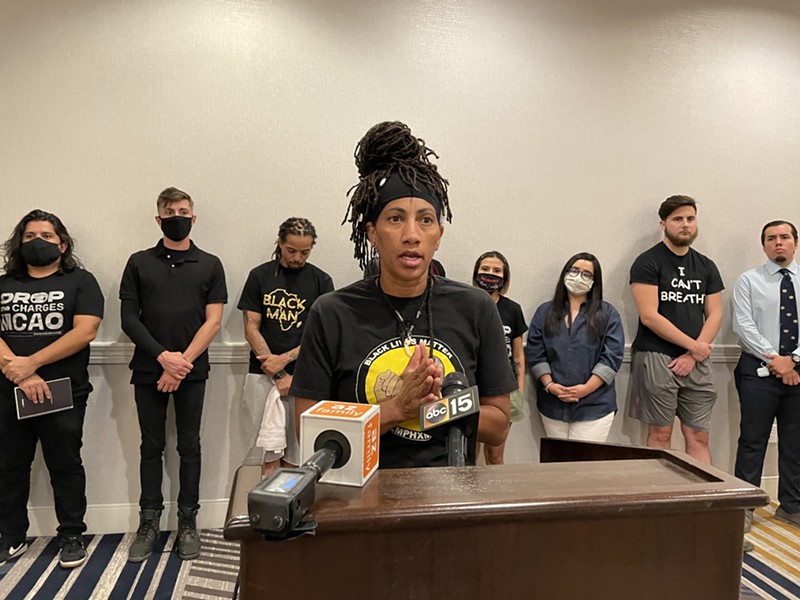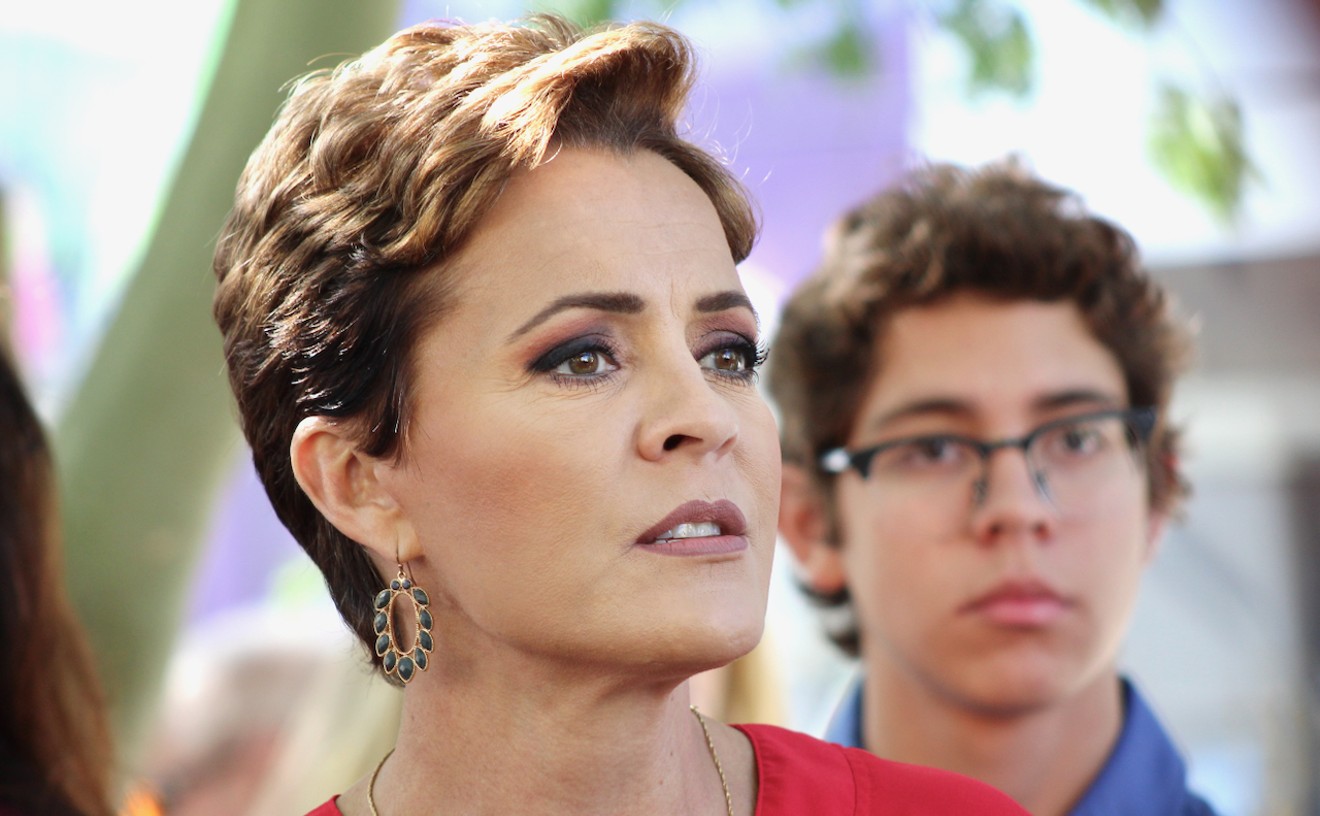Over a dozen anti-police brutality protesters filed a new lawsuit on Tuesday alleging that the Phoenix Police Department and the Maricopa County Attorney's Office colluded to maliciously prosecute them.
The 20 plaintiffs include several individuals who were charged last October with assisting a criminal street gang. That case fell apart after reporting revealed how police and prosecutors convinced a grand jury that protesters were part of a fictitious "ACAB" gang, and compared them to well-known gangs like the Bloods.
Maricopa County Attorney Allister Adel has since dismissed the cases. Bruce Franks Jr., a former Missouri state legislator and activist who was arrested last August while participating in a protest outside Phoenix Police headquarters, is also a plaintiff. His case was similarly dismissed last March.
In their 103-page federal complaint, the protesters accuse Maricopa County prosecutors and members of the Phoenix Police Department of "falsely prosecuting Black Lives Matters protesters for participating in a non-existent criminal street gang and conspiring to fabricate evidence." Maricopa County Attorney Allister Adel, Phoenix Police Chief Jeri Williams, and various prosecutors with the Maricopa County Attorney's Office (MCAO) and police officers are among the defendants named in the lawsuit.
The complaint alleges that Maricopa County and the city of Phoenix failed to properly supervise, train, or discipline the officers and attorneys involved in the prosecutions, and that both governments engaged in a "civil conspiracy." The lawsuit also claims that protesters' Fourth Amendment rights were violated due to excessive force, false arrest, and malicious prosecution. The plaintiffs are seeking damages.
"This lawsuit is about a fundamental issue, and that's the right of Arizonans and citizens and residents of this country to go out and express their opinion under the First Amendment," said Steve Benedetto, an attorney with The People's Law Firm representing the protesters, during a July 13 news conference about the lawsuit. "Would these people be standing here if they were out protesting mask mandates? Would they be standing here if they were out protesting suspicions about a rigged election?"
"Every single day we were met with Phoenix police in riot gear, waiting for us outside of our cars, targeting us, watching our social media, and really just using a show of force and trying to scare us away," said Keisha Acton, a plaintiff in the lawsuit and activist with Black Lives Matter Phoenix Metro. She was arrested last fall. "It didn't matter how we showed up and how peaceful we showed up. We were met with violence from the police department."
The complaint features detailed allegations about prosecutors' collaboration with law enforcement to "target" local Black Lives Matter activists in an alleged effort to "intimidate, disrupt, silence, and ultimately, incapacitate the local Movement for Black Lives."
The lawsuit targets Phoenix Police officers and Maricopa County prosecutors including April Sponsel, who's been placed on administrative leave since the dismissal of the protesters' criminal cases, accusing the officials of developing an "arrest plan" for "anyone in the area of a protest critical of law enforcement."
"On or about September 28, 2020, one or more of the MCAO Individual Defendants met with one or more of the PPD Defendants to develop a cohesive, yet illegal, 'strategy' for all past and future cases involving protestors, as well as a protocol for effectuating false arrests and charges in order to dissuade individuals from exercising their constitutionally protected First Amendment rights," the complaint states. "Since none of the Plaintiffs were actually in a criminal street gang, Defendant Sponsel pretended they were."
The theory that the protesters were part of a criminal street gang allegedly came from a historically unreliable informant, according to news reports and the lawsuit. But Sponsel, Nicholas Michaud — another prosecutor who worked the "ACAB gang" case — and police officers knew about the informant's credibility issues but chose to "hide" the information from the grand jury at an October 23 meeting.
At an October 31 meeting, after the grand jury had returned indictments against the protesters, Sponsel and members of MCAO "executive leadership" acknowledged that the testimony depicting the protesters as part of a gang was "false." However, the attendees "resolved to stand behind the false ACAB charges," the lawsuit states.
The filing goes on to assert that County Attorney Adel "actively participated in, approved, and/or ratified" the decisions to bring the false felony charges against the protesters. While Adel has sought to distance herself from the case in public statements — for instance, she claimed back in February that prosecutors failed to follow procedure while assessing the case — newly revealed text messages authored by Sponsel claim that Adel had direct knowledge of the plan to prosecute the protesters as a criminal street gang.
To hammer home the argument that Adel failed to hold anyone leading the case accountable for the concocted charges, attorneys distributed copies of an April 19, 2021, letter from Adel to Chief Williams regarding police officers' false testimony about protesters. While Adel requested that the department conduct an investigation for potential misconduct in the letter, she also stated that MCAO had not made any "credibility determinations" about the officers.
"We recognize that errors and mistakes happen," Adel wrote.
"Allister Adel in her short time in office has completely failed her professional responsibilities and completely lost public trust. She continues to dodge accountability and deny her role in this mess," Matthew Aguilar, an organizer with Mass Liberation Arizona, said at the July 13 news conference. "The tactics we have seen demonstrated by the highest levels of authority at the Maricopa County Attorney's Office are disgusting and reprehensible. Allister Adel is not fit to hold public office."
Maricopa County Superior Court Judge Jennifer Ryan-Touhill, in a court order dated June 3, appeared to agree with protesters' characterizations of the case.
Sponsel and one of the Phoenix police officers who testified before the grand jury, Sergeant Douglas McBride, committed "egregious misconduct" and "colluded in their efforts to present the grand jury with false information regarding a non-existent gang," the judge wrote. The grand jury presentation was "weak, disingenuous, and unprofessional," she wrote.
Jennifer Liewer, a spokesperson for the county attorney’s office, said the office couldn’t comment due to pending litigation.
Sergeant Mercedes Fortune, a spokesperson for the Phoenix Police Department, wrote in an email that the "Phoenix Police Department respects the judicial process and does not comment on pending litigation."
The lawsuits add to an existing stack of legal troubles for Adel, MCAO, and the City of Phoenix.
Last May, a class-action lawsuit was filed against Chief Williams and members of the Phoenix Police Department for arresting protesters en masse without probable cause during the crackdown on last summer's Black Lives Matter protests. A notice of claim — a procedural precursor to a lawsuit — was also filed in May against Adel and Sponsel by two former defendants in a case prosecuted by Sponsel that was dismissed by a judge last November. They allege that Sponsel similarly withheld evidence and lied to the grand jury in their case.
[
{
"name": "Air - MediumRectangle - Inline Content - Mobile Display Size",
"component": "18478561",
"insertPoint": "2",
"requiredCountToDisplay": "2",
"watchElement": ".fdn-content-body",
"astAdList": [
{
"adType": "rectangle",
"displayTargets": "mobile"
}
]
},{
"name": "Editor Picks",
"component": "16759093",
"insertPoint": "4",
"requiredCountToDisplay": "1",
"watchElement": ".fdn-content-body",
"astAdList": [
{
"adType": "rectangle",
"displayTargets": "desktop|tablet"
},{
"adType": "rectangle",
"displayTargets": "desktop|tablet|mobile"
}
]
},{
"name": "Inline Links",
"component": "17980324",
"insertPoint": "8th",
"startingPoint": 8,
"requiredCountToDisplay": "7",
"maxInsertions": 25
},{
"name": "Air - MediumRectangle - Combo - Inline Content",
"component": "16759092",
"insertPoint": "8th",
"startingPoint": 8,
"requiredCountToDisplay": "7",
"maxInsertions": 25,
"watchElement": ".fdn-content-body",
"astAdList": [
{
"adType": "rectangle",
"displayTargets": "desktop|tablet"
},{
"adType": "rectangle",
"displayTargets": "desktop|tablet|mobile"
}
]
},{
"name": "Inline Links",
"component": "17980324",
"insertPoint": "8th",
"startingPoint": 12,
"requiredCountToDisplay": "11",
"maxInsertions": 24
},{
"name": "Air - Leaderboard Tower - Combo - Inline Content",
"component": "16759094",
"insertPoint": "8th",
"startingPoint": 12,
"requiredCountToDisplay": "11",
"maxInsertions": 24,
"watchElement": ".fdn-content-body",
"astAdList": [
{
"adType": "leaderboardInlineContent",
"displayTargets": "desktop|tablet"
},{
"adType": "tower",
"displayTargets": "mobile"
}
]
}
]










